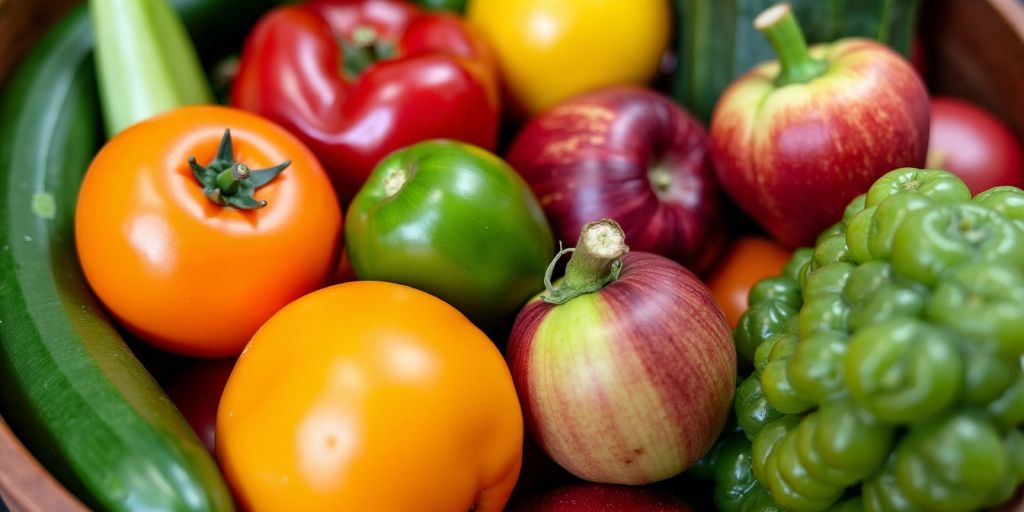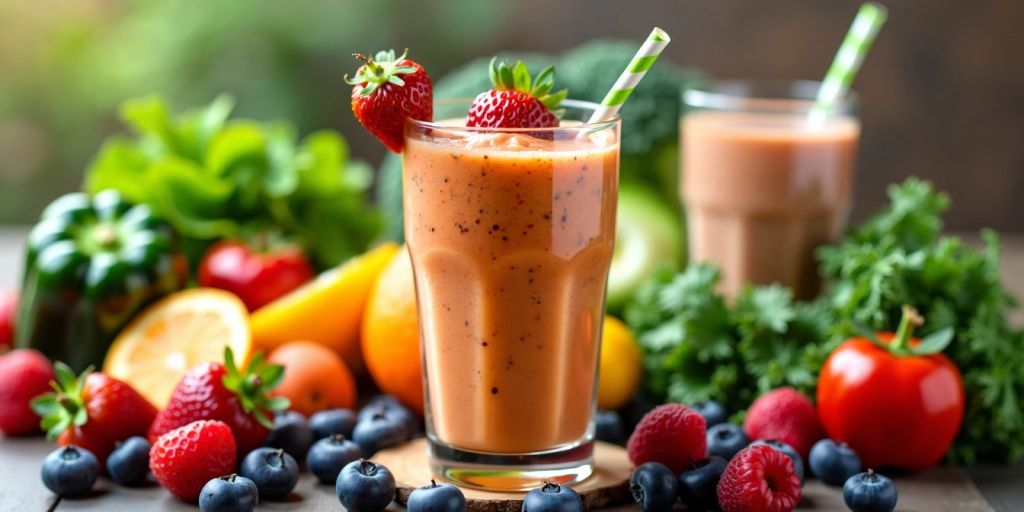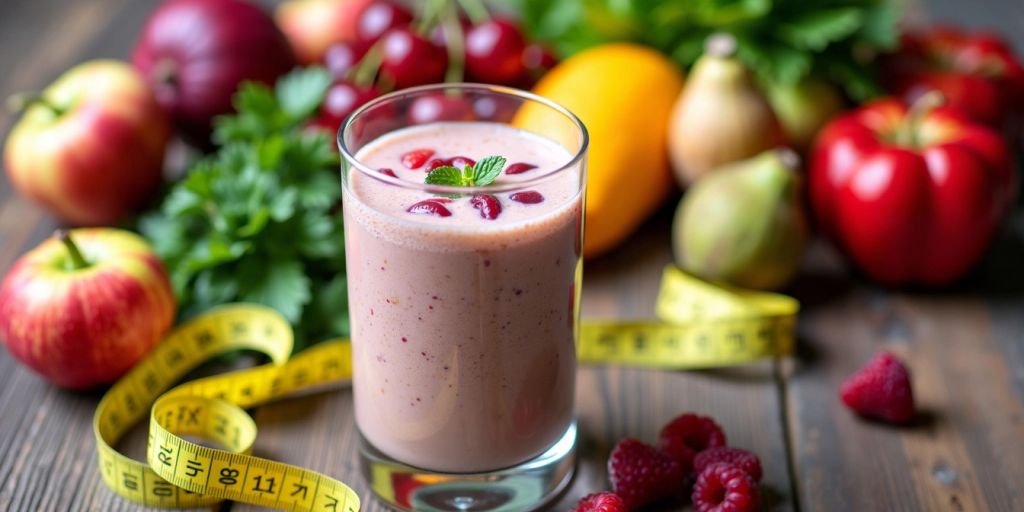Eating right is one of the best ways to stay healthy. With so many food choices, it's easy to get confused about what to eat. This guide will help you understand the best nutrition tips to keep you feeling great. From leafy greens to citrus fruits, we'll cover the top foods you should include in your diet.
Key Takeaways
- Leafy greens like spinach and kale are packed with vitamins and minerals that are essential for your health.
- Whole grains such as brown rice and oats provide fiber and help keep you full longer.
- Lean proteins, including chicken and fish, are important for muscle repair and overall health.
- Healthy fats found in avocados and nuts can improve heart health and keep you feeling full.
- Berries like strawberries and blueberries are rich in antioxidants, which help protect your body from damage.
1. Leafy Greens
Leafy greens are a powerhouse of nutrition and should be a staple in your diet. These vegetables, like spinach, kale, and collard greens, are packed with essential vitamins and minerals. Leafy salad greens are an excellent source of nutrition overall. They are particularly great sources of nitrates and several vitamins, including vitamin K, which is crucial for blood clotting and bone health.
Benefits of Leafy Greens
- Rich in Nutrients: Leafy greens are loaded with vitamins A, C, and K, as well as calcium, iron, and fiber. These nutrients support various bodily functions, from maintaining healthy vision to boosting the immune system.
- Low in Calories: These vegetables are low in calories, making them an excellent choice for those looking to maintain or lose weight without sacrificing essential nutrients.
- Heart Health: The nitrates found in leafy greens can help lower blood pressure and improve overall heart health.
How to Include More Leafy Greens in Your Diet
- Salads: Add a variety of leafy greens to your salads for a nutrient boost. Mix different types like spinach, arugula, and romaine for a tasty and healthy meal.
- Smoothies: Blend leafy greens into your morning smoothie. Spinach and kale blend well with fruits and can be a great way to start your day with a dose of vitamins.
- Soups and Stews: Incorporate greens into soups and stews. They add flavor and nutrients without adding many calories.
- Stir-Fries: Add greens to your stir-fries. They cook quickly and can be a delicious addition to your favorite dishes.
Including leafy greens in your diet can significantly contribute to your daily calcium intake and promote bone health. By diversifying your diet with these vegetables, you can ensure you're getting all the nutrients you need for healthy bones and teeth.
Remember, the key to a healthy diet is variety. So, mix up your greens and enjoy the benefits they bring to your overall health!
2. Whole Grains
Whole grains are a fantastic addition to any diet. They are packed with nutrients and offer numerous health benefits. Incorporating whole grains into your meals can significantly improve your overall health. Here’s why you should consider adding more whole grains to your diet:
- Rich in Fiber: Whole grains are an excellent source of dietary fiber, which helps in digestion and keeps you feeling full longer. This can aid in weight management and prevent overeating.
- Heart Health: Consuming whole grains can lower the risk of heart disease. They help reduce cholesterol levels and improve blood pressure.
- Nutrient-Dense: Whole grains are loaded with essential nutrients like B vitamins, iron, magnesium, and selenium. These nutrients are vital for various bodily functions, including energy production and immune support.
- Blood Sugar Control: Whole grains have a lower glycemic index compared to refined grains. This means they cause a slower rise in blood sugar levels, which is beneficial for managing diabetes.
Types of Whole Grains to Include in Your Diet
- Brown Rice: A versatile grain that can be used in a variety of dishes. It’s a great source of magnesium and fiber.
- Quinoa: Known for its high protein content, quinoa is also rich in iron and magnesium.
- Oats: Perfect for breakfast, oats are high in fiber and can help lower cholesterol levels.
- Whole Wheat: Found in bread, pasta, and other products, whole wheat is a staple in many diets and provides a good amount of fiber and nutrients.
- Barley: This grain is excellent for soups and stews and is known for its high fiber content.
Whole grains are a simple yet powerful way to boost your health. By making small changes to include more of these grains in your diet, you can enjoy a range of health benefits and feel your best every day.
Start incorporating whole grains into your meals today and take a step towards a healthier you!
3. Lean Proteins
Lean proteins are essential for building and repairing tissues, and they can help you feel full longer. Including lean proteins in your diet can support muscle growth and overall health.
Best Sources of Lean Proteins
Here are some of the best sources of lean proteins you can include in your meals:
- Turkey breast (skinless): A fantastic source of lean protein with minimal fat.
- Chicken breast (skinless, boneless): Another excellent option that's versatile and easy to cook.
- Beef liver: Packed with nutrients and a great way to get your protein fix.
- Pork (ground, 96 percent lean): A leaner alternative to regular ground pork.
- Beef (lean cuts): Opt for cuts like sirloin or tenderloin for a protein-rich meal.
Benefits of Lean Proteins
- Muscle Growth: Lean proteins provide the essential amino acids needed for muscle repair and growth.
- Weight Management: They help you feel full longer, reducing the urge to snack on unhealthy foods.
- Nutrient-Rich: Lean proteins are often packed with vitamins and minerals that support overall health.
Including a variety of lean proteins in your diet can make a significant difference in your health and well-being. From turkey breast to lean cuts of beef, these proteins are not only nutritious but also delicious and easy to prepare.
Tips for Cooking Lean Proteins
- Grill or Bake: Avoid frying to keep your meals healthy and low in fat.
- Season Well: Use herbs and spices to add flavor without adding extra calories.
- Pair with Veggies: Combine lean proteins with a variety of vegetables for a balanced meal.
4. Healthy Fats
Healthy fats are essential for a balanced diet and overall well-being. They help in reducing bad cholesterol levels and lower the risk of heart disease and stroke. Here are some key points to consider:
- Monounsaturated and Polyunsaturated Fats: These fats are beneficial for heart health. Foods like avocados, nuts, and certain fish are rich in these fats. They help reduce LDL cholesterol and keep you feeling full.
- Omega-3 Fatty Acids: Found in oily fish like salmon, these fats are known for their heart-health benefits. Including them in your diet can help maintain a healthy weight and reduce the risk of heart disease.
- Olive Oil: A great source of monounsaturated fats, olive oil is a healthier alternative to butter or margarine. It can be used in cooking or as a salad dressing.
Remember, while healthy fats are good for you, they are still high in calories. Moderation is key to reaping their benefits without overdoing it.
Incorporating these healthy fats into your diet can lead to better heart health and overall wellness.
5. Berries
Berries are tiny but mighty when it comes to nutrition. They are packed with vitamins, minerals, and antioxidants that can boost your health in numerous ways.
Health Benefits
- Rich in Antioxidants: Berries are loaded with antioxidants, which help fight off free radicals in your body. This can reduce your risk of chronic diseases.
- High in Fiber: The fiber in berries aids digestion and helps keep you full, which is great for weight management.
- Low in Calories: Despite being sweet and delicious, berries are low in calories, making them a perfect snack.
Types of Berries
- Blueberries: Known for their high antioxidant content, blueberries can help lower blood pressure and cholesterol. They may also improve cognitive function.
- Strawberries: These are rich in vitamin C and manganese, which are essential for your immune system and bone health.
- Raspberries: High in fiber and vitamin C, raspberries are excellent for your digestive health.
- Blackberries: These berries are packed with vitamins C and K, as well as fiber, making them great for your overall health.
How to Include Berries in Your Diet
- Add them to your morning cereal or yogurt.
- Blend them into smoothies for a refreshing drink.
- Use them as a topping for pancakes or waffles.
- Enjoy them as a simple, healthy snack.
Berries are not just delicious; they are a powerhouse of nutrients that can significantly improve your health. Enjoy them fresh, frozen, or dried, and reap the benefits!
6. Nuts and Seeds
Nuts and seeds are tiny powerhouses of nutrition. They are packed with protein, fiber, and healthy fats, including omega-3 and omega-6 fatty acids. Incorporating them into your diet can significantly boost your health.
Benefits of Nuts and Seeds
- High in Protein: Nuts and seeds are high in protein, which is essential for muscle repair and growth.
- Rich in Fiber: They help in digestion and keep you feeling full longer.
- Healthy Fats: These include monounsaturated and polyunsaturated fats, which are good for your heart.
Types of Nuts and Seeds to Include
- Almonds: Great for snacking and adding to dishes.
- Chia Seeds: Perfect for smoothies and puddings.
- Walnuts: Excellent source of omega-3 fatty acids.
- Flaxseeds: Can be added to cereals and baked goods.
Enjoy the journey to a healthier you by adding a variety of nuts and seeds to your meals. They are versatile and can be easily incorporated into your diet.
Tips for Including Nuts and Seeds in Your Diet
- Snack on Them: Keep a small bag of mixed nuts and seeds for a quick and healthy snack.
- Add to Meals: Sprinkle them on salads, yogurt, or oatmeal.
- Use Nut Butters: Spread almond or peanut butter on toast or add to smoothies.
- Bake with Them: Include them in your baking recipes for added crunch and nutrition.
7. Legumes
Legumes are a fantastic addition to any diet. They are packed with antioxidants and vital minerals like folate, iron, and magnesium. These nutrients are essential for maintaining good health and preventing various diseases.
Benefits of Legumes
- Rich in Nutrients: Legumes are loaded with essential vitamins and minerals that your body needs to function properly.
- High in Protein: They are an excellent source of plant-based protein, making them a great option for vegetarians and vegans.
- Fiber-Rich: Legumes are high in dietary fiber, which helps in digestion and keeps you feeling full longer.
- Low in Fat: Most legumes are low in fat, making them a healthy choice for those looking to maintain or lose weight.
How to Include Legumes in Your Diet
- Salads: Add cooked beans or lentils to your salads for an extra protein boost.
- Soups and Stews: Legumes are perfect for adding to soups and stews, making them heartier and more nutritious.
- Snacks: Roasted chickpeas or edamame make for a tasty and healthy snack.
- Main Dishes: Use legumes as the main ingredient in dishes like chili, curry, or veggie burgers.
Including more legumes in your diet can significantly improve your overall health. They are versatile, nutritious, and delicious, making them a must-have in your kitchen.
8. Fermented Foods
Fermented foods are a fantastic addition to any diet. They are not only delicious but also packed with health benefits. Fermenting foods may aid weight loss and support overall well-being.
Benefits of Fermented Foods
- Supports Heart Health: Fermented foods may support heart health and lower the risk of heart disease.
- Boosts Immune Function: They can help support immune function and reduce the risk of infection.
- Aids Digestion: Fermented foods are rich in probiotics, which are beneficial bacteria that aid digestion and improve gut health.
Popular Fermented Foods
- Yogurt: A great source of probiotics, calcium, and protein.
- Kimchi: A spicy Korean dish made from fermented vegetables, rich in vitamins A, B, and C.
- Sauerkraut: Fermented cabbage that is high in fiber and vitamins C and K.
- Kombucha: A fermented tea that is a good source of probiotics and antioxidants.
Including fermented foods in your diet can be a simple and tasty way to boost your health. Start with small portions and gradually increase to allow your body to adjust to the new beneficial bacteria.
Incorporating these foods into your meals can be a fun and easy way to improve your health. So, why not give them a try?
9. Citrus Fruits
Citrus fruits like oranges, lemons, limes, and grapefruits are not only delicious but also packed with essential nutrients. They are a fantastic source of Vitamin C, which is crucial for maintaining a healthy immune system and skin health.
Benefits of Citrus Fruits
- Rich in Vitamin C: Helps boost your immune system and keeps your skin glowing.
- High in Fiber: Aids in digestion and helps keep you full longer.
- Low in Calories: Perfect for those looking to maintain or lose weight.
- Hydrating: With high water content, they help keep you hydrated.
How to Include Citrus Fruits in Your Diet
- Morning Juice: Start your day with a glass of fresh orange or grapefruit juice.
- Salads: Add orange or grapefruit segments to your salads for a zesty twist.
- Snacks: Keep a bowl of clementines or tangerines handy for a quick, healthy snack.
- Cooking: Use lemon or lime juice to add flavor to your dishes without extra calories.
Including citrus fruits in your daily diet can be a simple yet effective way to boost your overall health. Their refreshing taste and numerous health benefits make them a must-have in any balanced diet.
So, next time you're at the grocery store, don't forget to pick up some citrus fruits. Your body will thank you!
10. Cruciferous Vegetables
Cruciferous vegetables like broccoli, cauliflower, and Brussels sprouts are nutritional powerhouses. They are packed with vitamins, minerals, and fiber. These veggies are known for their anti-cancer properties and are high in fiber and vitamins C and K.
Health Benefits
- Anti-Cancer Properties: Cruciferous vegetables contain compounds that may help prevent cancer. These compounds help detoxify the body and protect cells from damage.
- Rich in Fiber: High fiber content aids in digestion and helps maintain a healthy weight.
- Vitamins and Minerals: These vegetables are rich in essential vitamins and minerals, including vitamins C and K, which support immune function and bone health.
- Heart Health: Regular consumption can improve heart health by reducing inflammation and improving blood cholesterol levels.
How to Include Them in Your Diet
- Salads: Add raw broccoli or cauliflower to your salads for a crunchy texture.
- Stir-Fries: Include a mix of cruciferous vegetables in your stir-fries for a nutrient boost.
- Roasting: Roast Brussels sprouts with a bit of olive oil and seasoning for a delicious side dish.
Including a variety of cruciferous vegetables in your diet can significantly improve your overall health. They are versatile, delicious, and easy to incorporate into many dishes.
Conclusion
Achieving optimal health through nutrition doesn't have to be complicated. By making small, consistent changes to your diet, you can see big improvements in your overall well-being. Remember to focus on whole foods, balance your meals, and stay hydrated. It's all about finding what works best for you and sticking with it. With these tips, you're well on your way to a healthier, happier you. Keep experimenting, stay positive, and enjoy the journey to better health!
Frequently Asked Questions
What are the basic nutrients I should know about?
The basic nutrients include carbohydrates for energy, proteins for building and repairing tissues, fats for hormone production, vitamins and minerals for various bodily functions, and water for hydration.
How can I make sure I'm eating a balanced diet?
To eat a balanced diet, include a variety of foods from all food groups: fruits, vegetables, whole grains, lean proteins, and healthy fats. Aim for a mix of colors and types to get a range of nutrients.
Why are leafy greens important for my diet?
Leafy greens are packed with vitamins, minerals, and fiber. They help improve digestion, support heart health, and provide essential nutrients like vitamin K and iron.
What are some examples of whole grains?
Examples of whole grains include brown rice, quinoa, whole wheat bread, oats, and barley. These grains are rich in fiber and essential nutrients.
How do lean proteins benefit my health?
Lean proteins, such as chicken, fish, tofu, and beans, provide essential amino acids without the added saturated fats. They help build and repair tissues and support overall health.
What are healthy fats and why do I need them?
Healthy fats, found in avocados, nuts, seeds, and olive oil, are essential for brain function, hormone production, and energy. They also help absorb fat-soluble vitamins.
Why should I include berries in my diet?
Berries are rich in antioxidants, vitamins, and fiber. They help fight inflammation, support heart health, and can improve digestion.
What are the benefits of eating fermented foods?
Fermented foods like yogurt, kefir, and sauerkraut contain probiotics that support gut health, improve digestion, and boost the immune system.




